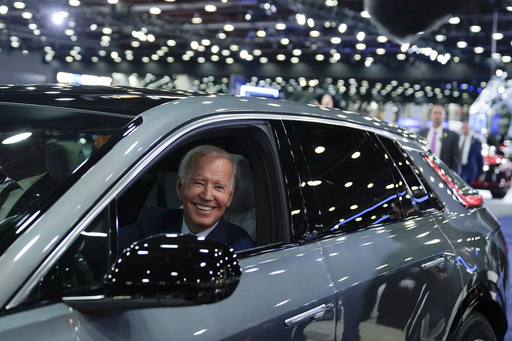The Biden administration is allocating close to $2 billion in grants to aid in the revival or expansion of electric vehicle production and assembly facilities in eight states, including crucial battleground states like Michigan, Pennsylvania, and Georgia. The Energy Department is set to distribute grants totaling $1.7 billion to create or maintain numerous union jobs and sustain communities reliant on the automotive sector that has been a cornerstone of the U.S. economy. Additionally, apart from the battleground states, funds will also be granted to electric vehicle facilities in Ohio, Illinois, Indiana, Maryland, and Virginia.
The allotted grants encompass various aspects of the automotive supply chain, such as components for electric motorcycles and school buses, hybrid powertrains, heavy-duty commercial truck batteries, and electric SUVs, as per the White House. President Joe Biden emphasized the significance of constructing a clean energy economy that benefits both union autoworkers and automakers. Biden expressed that this investment will generate thousands of well-paid, union manufacturing jobs and preserve many more positions across multiple locations, aiding auto companies in transforming, revitalizing, and rehiring within the same factories and communities from Lansing, Michigan, to Fort Valley, Georgia.
The grants, financed through the landmark 2022 climate legislation, aim to fulfill Biden’s commitment to ensuring that the future of the automotive industry is crafted in America by American union laborers. The Democratic president highlighted that workers who suffered setbacks during the previous administration are now experiencing a resurgence with the backing of his policies, notably the conversion grants being unveiled currently.
Energy Secretary Jennifer Granholm, a former Michigan governor, underlined the difficulty faced by manufacturing communities when jobs are lost to international competition and industry evolution. Granholm emphasized the importance of these new grants in keeping the U.S. automotive industry competitive, particularly as countries like China make substantial investments in electric vehicles.
The latest grants supplement approximately $177 billion in private sector investments in electric vehicle and battery production since Biden assumed office, according to Granholm and other officials. The awards are contingent on negotiations to ensure that commitments to workers and communities are honored, with the Energy Department slated to finalize environmental assessments before disbursing funds later this year.
Should the awards proceed as planned, the selected projects have the potential to create over 2,900 jobs and help sustain about 15,000 union workers across all 11 facilities, as stated by the White House. These grants follow successful union organization initiatives from Chattanooga, Tennessee to Fort Valley, Georgia. Lael Brainard, White House national economic adviser, affirmed Biden’s unwavering support for the U.S. auto industry.
Transportation stands as the most significant source of greenhouse gas emissions in the U.S., prompting Biden to position electric vehicles as a central component of his climate strategy. White House climate adviser Ali Zaidi touted the move toward cleaner transportation options, citing benefits such as significant fuel and maintenance cost savings for consumers over a vehicle’s lifespan by transitioning to electric.
Notable companies set to receive grants include Blue Bird Body Co., Fiat Chrysler, General Motors, Harley-Davidson, and Volvo Group, each assigned funds for various projects related to electric vehicle production and enhancement of manufacturing facilities. General Motors, for instance, will benefit from a $500 million grant to convert an assembly plant in Lansing, Michigan into an EV production site, aligning with efforts to bolster the U.S. battery supply chain and accelerate the introduction of advanced and affordable EVs.
Home Money & Business Biden Allocates $1.7 Billion to Support Electric Vehicle Production in Eight States
